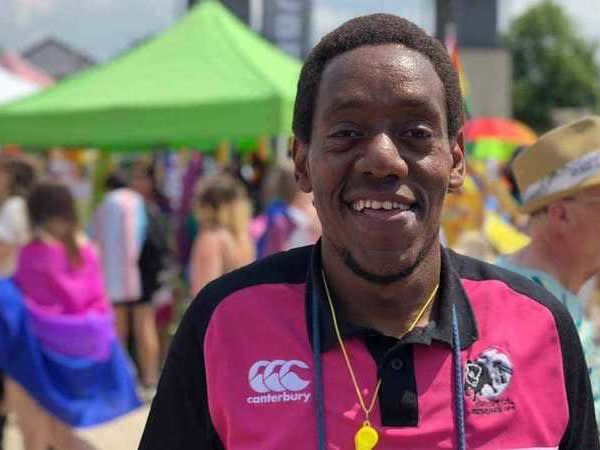Bristol rugby team urges Home Office to stop gay teammate being deported to Kenya

A rugby team in Bristol is calling on the Home Office to halt the deportation of one of its gay team members to Kenya, arguing he faces homophobic persecution and violence there.
Kenneth Macharia, 38, from Shepton Mallet in Somerset, could be deported “at any time” after being detained on Thursday when his request for asylum was rejected by the Home Office.
It comes after a judge ruled Mr Macharia could live openly as a gay man in Kenya, despite sex between men being punishable by up to 21 years in prison and reports of homophobic mob violence across the conservative African country.
A petition set up by amateur rugby club the Bristol Bisons that calls on Sajid Javid, the home secretary, to intervene had gained more than 6,000 signatures by Tuesday afternoon.
The majority of players in the Bisons are gay and the club describes itself as “inclusive”.
Mr Macharia came to the UK as a student to study mechanical engineering in 2009, before getting a work visa.
He told The Independent it took him some time to come out as gay after arriving in England as he feared violent reprisals previously anticipated in the east African nation.
“I was surprised to see that the judge said a gay person can live openly [in Kenya],” he said.
“There is a high risk of mob violence. There are criminals who try to blackmail people online.
“By going back to Kenya I would have to hide who I am.”
Gay sex is illegal in Kenya under vaguely-worded British colonial-era laws known as Sections 162 and 165. LGBT+ campaigners also warn gay people are subject to police harassment and threats of anal examinations.
Kenya’s vice president, William Ruto, has said there is “no room” for gay people in Kenya. Meanwhile the director of the country’s media office, Ezekiel Mutua, who decides what is permissible on television, earlier banned a film about two women who fall in love, saying it “seeks to overtly promote lesbianism”.
Mr Macharia worked as a design engineer until he was forced to stop working when his request for asylum was denied earlier this year.
His mother, a nurse who lives in Bristol, had to take on extra shifts to help him pay his rent, he said.
Mr Macharia said he felt guilty about his mother’s sacrifice and said he had grown depressed as his case had “dragged on”.
He suffered from bouts of anxiety while waiting for letters from authorities and was trying to cope with his situation through medication, positive thinking, meditation and exercise.
Now, held in an immigration detention centre in Heathrow, Mr Macharia said: “I’ve never been to prison so it feels like prison to me. I’m worried about what happens next.”
Chairman of the Bisons, Phil Rogerson, told The Independent Mr Macharia “had a normal life and all of a sudden it was stopped”.
He added: “He’s so polite and such a gentleman. He’s just a genuinely nice person – we’ve had people get injured and he’s driven them to the hospital and waited with them in [the accident and emergency department].”
Mr Rogerson said he was horrified at the decision to remove the 38-year-old to a country with homophobic laws.
Players were aware such deportations took place, but the decision in their teammate’s case had “brought it home”, he said.
“We know somebody that it’s been affecting now. It’s upset a lot of people in the club,” he added.
The rugby club’s petition says: “Ken’s story is yet another example of the Home Office ignoring the risks that LGBT people face in multiple countries around the world.
“Ken is an integral part of our rugby family at Bristol Bisons RFC. His commitment to the ethos of rugby and to our team is second to none.
“Ken is a quiet, kind, and caring person and he is one of the most loved people at our rugby club. Our team would not be the same without his warm character.
“Deporting a good, hard-working, gay man to a country where homophobic violence and imprisonment is rife is immoral and unjust, and should be stopped.”
Home Office guidance, which informs decisions in asylum cases, says “societal attitudes are generally intolerant of LGBT persons” in Kenya.
The guidance continues: “LGBT persons are vulnerable to harassment, blackmail, intimidation, and discrimination in employment, education, housing and accessing healthcare.
“LGBT people have also been victims of individual acts of violence although there are few reported incidents in recent years.”
A Home Office spokesperson said the department does not comment on individual cases, but issued a statement that said: “This government has a proud record of providing protection for asylum seekers fleeing persecution because of their sexual orientation or gender identity and the UK remains a world leader in its approach to handling this type of asylum claim.
“We are committed to delivering an asylum process that is sensitive to all forms of persecution including those based on sexual identity or orientation.”
They added: “We have a robust assurance mechanism which involves considering all available evidence in light of published country-specific information.”

 Yahoo News
Yahoo News 